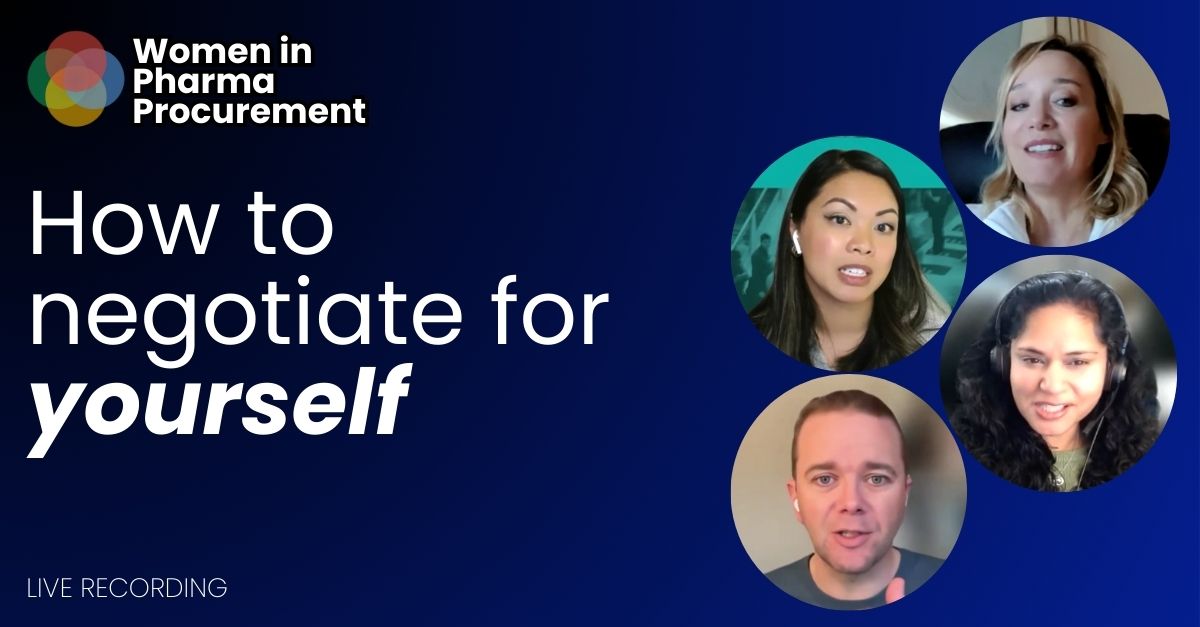Negotiating for yourself can be challenging. If you are a woman there are still implicit biases you might face, and self-doubt that can undermine your confidence and performance. Yet, knowing your worth and negotiating for it is crucial for advancing your career, increasing your income, and achieving your goals.
In the latest Women in Pharma Procurement meetup, our expert panel shared best practices for how to negotiate for yourself effectively, overcome common barriers, and close the gender pay gap.
Why it matters:
- Continuing gender pay gap: In 2021, women earned only 83% of what men earned in full-time wage and salary roles. After an MBA, the gap widened to 63% ten years later.
- The long game matters: A small difference in starting salary can have a huge impact on your wealth over time. For example, if you get a $100,000 salary and your co-worker negotiates up to $107,000, you would have to work eight years longer to be as wealthy as them at retirement.
Listen to the recording of the discussion here:
With thanks to our panellists: Carmen Kerschbaum, SVP Finance, Pfizer; Alicia Ryan. Principal Consultant, Proxima (Bain & Co); Mamta Arora, Procurement and DE&I Leader; Marianne Gissane, Co-Founder, Talent Sandbox; Neil Kelly, Founder, Vector Partners; Francesca Moro, Group Procurement & Sourcing Lead, Roche.
Challenges women can face in negotiating
Marianne Gissane, Co-Founder of Talent Sandbox shared three common challenges that women can face when it comes to negotiating for themselves:
- Not preparing well: lacking knowledge about how much they want and why and inability to communicate this effectively
- Women tend to have systematically lower expectations resulting in systematically lower outcomes
- Reputational Risks: research shows that women may be unjustly penalised for negotiating compared to male peers
Marianne presented a ‘Negotiation Toolkit‘ covering the how to research, plan, ask and respond:

Know your worth and ask for it
“I always thought it must be good enough that everyone sees what a good job I’m doing, and that’s enough. But what I came to realise is you need to talk about it and have your facts ready. “ said Carmen Kerschbaum, SVP Finance at Pfizer.
“Be really well prepared, know your facts and take what you’re worth and add 10%. Be bold! Even to your walk away point, make it something you want it be, to give you an extra stretch”
“My experience has always been to just ask for whatever you really want. And I don’t think anyone on the other side will walk away, even if it’s way too high for them. They will tell you. And they will engage in a negotiation.”
“You can’t lose by erring on the high end because that helps you calibrate and starts a conversation at a different point. I have never experienced a situation where people would walk away because the number was too high”
Referring to the statistics shared above, Mamta Arora emphasised the importance of starting off at the right level. “Make sure that when you enter a new organisation make sure you set the initial baseline high as possible from the start. From that point on it will only be incremental increases. ”

Salary Benchmarking
“Many job postings now have to give you a range of salaries. So it has become much easier to benchmark” says Mamta.
“Even if it’s a new role to that company, it will likely be there in the industry. So as long as you can look at the qualifications for that role and see if it matches. With the availability of data out there, it has become a lot easier to figure out that range”
Challenge the banding
“Who says that is the limit of the banding?” says Carmen.
“We’re too easily told nothing can be done about banding. You can sometimes identify a certain component or wording in your job description that gives you an indication on how much is this should page vs my current level – elements you might maybe find in a director, a senior director, VP role. That helps gauge where you would calibrate. “
Be prepared to move horizontally
One option is to move horizontally, says Neil Kelly, CEO and Founder of Vector Partners.
“When you think about your career progression, you may actually want to pick up different skills, responsibilities, areas or regions. Organizations will very often give you a salary increase to take on that extra responsibility.”
“So although you haven’t actually physically moved up in the banding, you may have actually increased responsibility which allows you to navigate through the pay scales. It’s a route I see very effective for those leaders who are really bumping up against that very ceiling of the compensation structure.”
Do your homework on who you’re negotiating with
“Really nail the person you’re talking to.” said Carmen. “Do the homework on the person you’re having the conversation with – what is important to them. Even think about cultural differences. In Germany for example negotiating is all about having your detailed facts ready, other cultures more about building personal relationships.”
Mamta agreed “Know the party that you’re negotiating with. Are they going to be willing to budge or not and how aggressive do you want to be.”
Navigating reputational risk
“In an ideal world, we would want to be moving beyond that. But the reality is we’re still having to be mindful of how we’re presenting ourselves and we’re entering negotiations.”
“When you’re negotiating as a woman, there is an increased chance of having that reputational risk of coming off too assertive, too pushy and having that follow you in your career.”says Marianne.
One way to mitigate negative reputational risk is with “Community motivation” says Marianne.
“If you approach it from the standpoint of how what I’m bringing to the table that will help you achieve organizational goals, that’s a double whammy. You can explain what you’re worth and why you’re worth that, but also backing it up with the impact you’re going to make on the business.”
Use your network to prepare
“Embrace the support you can get. There are so many sponsors, mentors or peers that can help you prepare your storyline and build your worth” says Carmen
“Don’t feel like there’s always has to be this formal relationship of mentoring or sponsorship. Sometimes it’s just one conversation or sometimes it’s whatever you need. So don’t be shy about getting the insight you need.“ says Mamta.
Prepare your non-negotiables
“Don’t shy away from being open and transparent about some of your non negotiables” says Carmen “Something I enjoy doing is making sure I have a clear list of my non negotiables already sort of written out and I’m very clear about that. It is way beyond salaries. It can be vacation or remote work.
“You can do it in a very nice way. You can say, ‘Here’s my idea. What do you think?’ which opens up the conversation.
Don’t miss the next Women in Pharma Procurement Meetup: Elevating Women in Pharma, taking place on International Women’s Day 8th March 2024. Sign up here












 Stay ahead of trends and best practices
Stay ahead of trends and best practices
